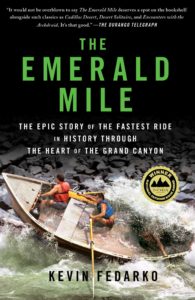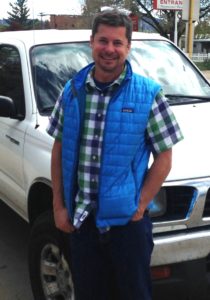We spoke recently with Kevin Fedarko, author of The Emerald Mile: The Epic Story of the Fastest Ride in History Through the Heart of the Grand Canyon.
Fedarko, a former senior editor of Outside magazine, spoke at the Cortez Public Library as part of the Amazing Author series.
We met over lunch, before he headed off to another speaking engagement in Telluride.
COO: You’re really self-deprecating. Not just as a public speaker but as an oarsman (Fedarko manned the boat which carried  the latrines during his boating stints on the Colorado River). Are you really that bad?
the latrines during his boating stints on the Colorado River). Are you really that bad?
KF: No, I can’t resist a good joke on myself. The basic parameters of that story are true. I was a very bad oarsman. I’m still not great. And I did become the permanent poo boat guy. But I also knew that it was a great story. It’s kind of hilarious. And I knew that it would teach me something. Had I focused more on being an oarsman, I would have gotten better. I would have proven myself over time and acquired those skills. But I made a conscious decision not to because ultimately I’m a writer. I’m not a dory boatman. I had to decide that one avenue was more valuable than the other.
COO: And you’re not a bad presenter either. Your presentation was polished and thoughtful. Did you have help?
KF: I haven’t had any coaching. I have done it dozens of times. It is kind of polished. But I am really awkward when I start. It takes me a good 10 minutes to get going. That’s who I am: someone who’s very uncomfortable being up there, who’s stumbling over himself, who’s not a natural. Someone once told me that the difference between an introvert and an extrovert is that an extrovert derives energy from being around people and an introvert has energy sucked out of them. I’m definitely the latter.
COO: How do you divide your time now? Over the last few months?
KF: The last several months have been sort of insane. Pete and I have been trying to complete this walk and then write the story immediately. It’s been kind of like two trains colliding. I have also just completed a ghost-writing project. You’re also catching me at a moment where I don’t think I’ve ever been more exhausted. There is no balance in my life at the moment.
But starting June, I have nothing for two months. I have a pile of books I want to read. Nothing else.
COO: Are you happy with your daily, monthly, yearly life? With your accolades and whatnot?
KF: I think you’re laboring under the misimpression that there is all this acclaim. Sam Carter interviewed me for a radio interview and asked ‘What’s it like to be famous?’ I’m like, ‘Dude…’
COO: But book tours and racing around southwestern Colorado is not sitting in a lonely, dark room, typing away.
KF: It’s not as if the phone is ringing off the hook and people are calling all the time, asking me to speak.

Kevin Fedarko pauses before heading to Telluride
COO: At the Cortez library, you showed a video of the specter of Grand Canyon development. Looking ahead to the generations to follow, are you depressed, optimistic?
KF: I’m not a father and I don’t think I know enough about young people to either be inspired or depressed. Around them, I find myself experiencing a bit of both. I worry that people don’t read. I worry that kids spend most of their time indoors.
COO: I noticed that most people at your talk were our age. (We’re both around 50 years old.)
KF: You’re right. But there are times when I run into young people and I think they’re amazing. There’s an organization called Grand Canyon Youth. The whole mission is to put young people on the river. They’re incredible.
People my age have been worrying about the superficiality and general cluelessness of young people since probably the age of rock art. I think some of these worries are a bit manufactured.
Read Part I